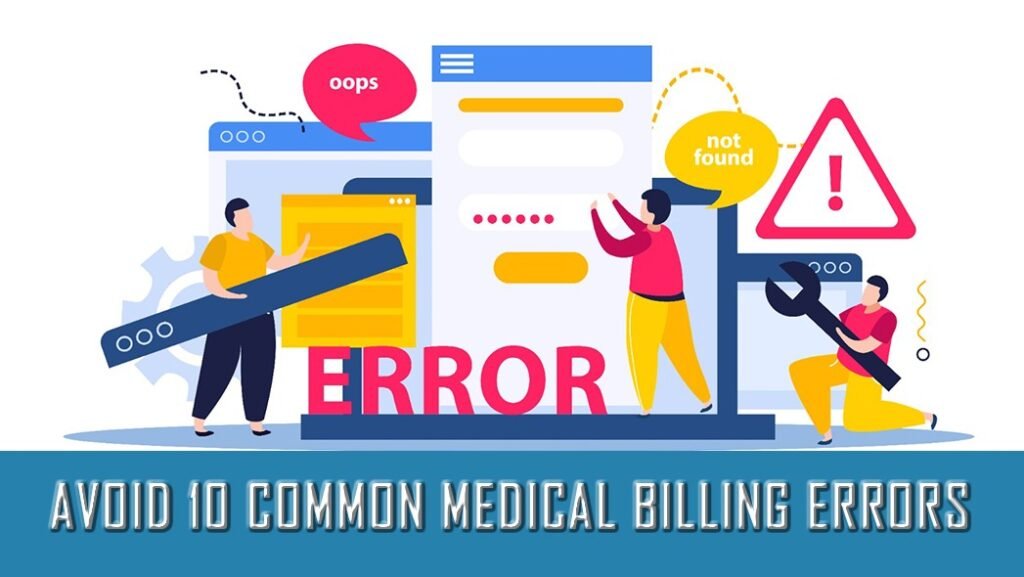AVOID 10 COMMON MEDICAL BILLING ERRORS
Introduction
Medical billing errors are periodic statements or reflections of an extension of credit not made to a person or consumer who has implied, actual or apparent authority to use a credit card or open-end credit plan. It happens when healthcare professionals bill patients for services they have not received or incorrect services. Medical billing error also occurs when scheduled services of patients are included in the billing and later canceled. These errors also included misapplied payments, billing error calculations, statement errors, or unrecognized statement changes. As a result, medical professionals have to face denial claims, delayed payments, and some, it turns out, in the form of substantial financial loss. The article will discuss 10 common errors in medical billing to help you avoid all hazards that happen in medical billing. Following are the common errors to watch out for
Inaccurate information about patients
Entry of incorrect patient information is the most common medical billing error during claim submission. Misspelled names, invalid insurance numbers, contact information, erroneous birthdates, and other demographic detail entered incorrectly. To avoid error and claim rejection, ensure this information is correctly entered and updated regularly.
Coding errors
Sometimes error happens when assigning procedure and diagnostic codes that turn out as claim denials. To avoid such medical billing errors, having reliable coding resources and updating yourself with coding guidelines is essential.
Up-coding and down-coding
Up-coding is billing for a higher level of services, and down-coding is medical billing for a lower level of medical services. Such a type of coding can lead to financial loss or fraud. To avoid such problems, always ensure that billing codes accurately reflect the provided services.
Unbundling services
Unbundling is a fraud due to complex bills and providing multi-step procedure bills separately rather than one code procedure. Individual billing steps allow the healthcare professional to gain more reimbursement from the same procedure. It involves separately billing for medical procedure components instead of using the appropriate bundle code. To avoid this, constantly update yourself with the guideline of bundle code and make the bill accordingly.
Lack of documentation
Claim denial usually happens due to incomplete or insufficient documentation. To avoid such medical billing errors, ensure that medical records support the services billed and include necessary details like patient treatment details, patient condition, and patient outcomes.
Failure to verify insurance coverage
Always provide insurance coverage to patients, including benefits, preauthorization, and eligibility, to avoid payment delays and claim rejections.
Missed timelines
Always ensure that the claim should be submitted within the specified timeframe. So, avoid claim denials happening due to late claim filling. Familiarize yourself with the limits of timely filling and remain strictly adhere to these limits.
Lack of medical necessity
Ensure that medical service bills are supported with appropriate medical documentation and are medically necessary. It might be because medically unnecessary bills are denied by insurance companies.
Lack of billing staff training
Medical billing errors happen due to a lack of staff training. Such medical billing errors are avoided by providing proper training to all staff members involved in the billing process. They should know the medical code and tend to upgrade it regularly to withstand dynamic and consistent changes happening in the medical billing field.
Duplicate billing
Intentional or unintentional submission of duplicate claims for the same or different service can cause claim rejection or sometimes fraud. It happens when a provider submits the same claim to multiple insurance companies, or there could be a system error. That is why, to avoid medical billing errors, it is essential to implement a proper system. Furthermore, ensure all billing claims are correctly submitted in the first entry.
Failure to appeal denied claims
A denial claim doesn’t mean that you should give up. Always investigate the reason for claim denial, submit an appeal, and gather necessary documents within the timeframe. Consistency and persistence help you successfully resolve the claim denial issue.
Conclusion
You can improve the revenue cycle and reduce billing errors by implementing proper billing practices and being vigilant. It will lead you to gain an aspired and healthy financial position in a noble healthcare career.
For further details and daily updates, please follow us on LinkedIn or join us on Quora.

